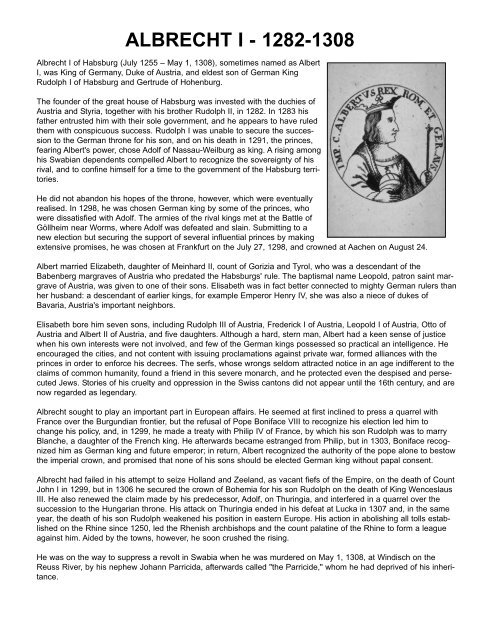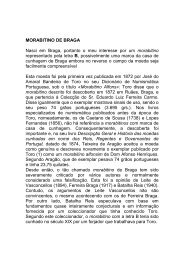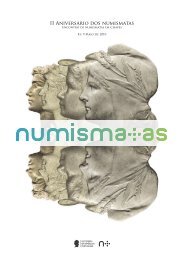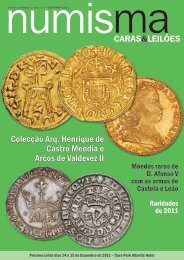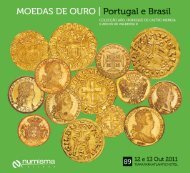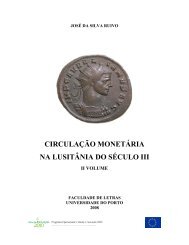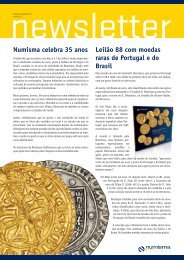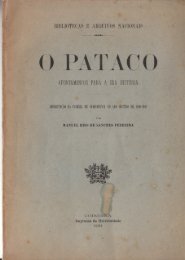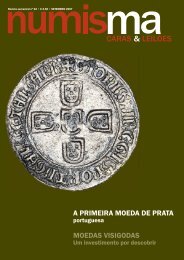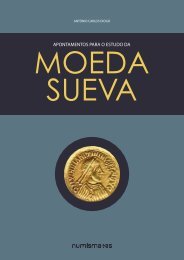Silver Pfennigs and Small Silver Coins of Europe in the Middle Ages
Silver Pfennigs and Small Silver Coins of Europe in the Middle Ages
Silver Pfennigs and Small Silver Coins of Europe in the Middle Ages
You also want an ePaper? Increase the reach of your titles
YUMPU automatically turns print PDFs into web optimized ePapers that Google loves.
ALBRECHT I - 1282-1308<br />
Albrecht I <strong>of</strong> Habsburg (July 1255 – May 1, 1308), sometimes named as Albert<br />
I, was K<strong>in</strong>g <strong>of</strong> Germany, Duke <strong>of</strong> Austria, <strong>and</strong> eldest son <strong>of</strong> German K<strong>in</strong>g<br />
Rudolph I <strong>of</strong> Habsburg <strong>and</strong> Gertrude <strong>of</strong> Hohenburg.<br />
The founder <strong>of</strong> <strong>the</strong> great house <strong>of</strong> Habsburg was <strong>in</strong>vested with <strong>the</strong> duchies <strong>of</strong><br />
Austria <strong>and</strong> Styria, toge<strong>the</strong>r with his bro<strong>the</strong>r Rudolph II, <strong>in</strong> 1282. In 1283 his<br />
fa<strong>the</strong>r entrusted him with <strong>the</strong>ir sole government, <strong>and</strong> he appears to have ruled<br />
<strong>the</strong>m with conspicuous success. Rudolph I was unable to secure <strong>the</strong> succession<br />
to <strong>the</strong> German throne for his son, <strong>and</strong> on his death <strong>in</strong> 1291, <strong>the</strong> pr<strong>in</strong>ces,<br />
fear<strong>in</strong>g Albert's power, chose Adolf <strong>of</strong> Nassau-Weilburg as k<strong>in</strong>g. A ris<strong>in</strong>g among<br />
his Swabian dependents compelled Albert to recognize <strong>the</strong> sovereignty <strong>of</strong> his<br />
rival, <strong>and</strong> to conf<strong>in</strong>e himself for a time to <strong>the</strong> government <strong>of</strong> <strong>the</strong> Habsburg territories.<br />
He did not ab<strong>and</strong>on his hopes <strong>of</strong> <strong>the</strong> throne, however, which were eventually<br />
realised. In 1298, he was chosen German k<strong>in</strong>g by some <strong>of</strong> <strong>the</strong> pr<strong>in</strong>ces, who<br />
were dissatisfied with Adolf. The armies <strong>of</strong> <strong>the</strong> rival k<strong>in</strong>gs met at <strong>the</strong> Battle <strong>of</strong><br />
Göllheim near Worms, where Adolf was defeated <strong>and</strong> sla<strong>in</strong>. Submitt<strong>in</strong>g to a<br />
new election but secur<strong>in</strong>g <strong>the</strong> support <strong>of</strong> several <strong>in</strong>fluential pr<strong>in</strong>ces by mak<strong>in</strong>g<br />
extensive promises, he was chosen at Frankfurt on <strong>the</strong> July 27, 1298, <strong>and</strong> crowned at Aachen on August 24.<br />
Albert married Elizabeth, daughter <strong>of</strong> Me<strong>in</strong>hard II, count <strong>of</strong> Gorizia <strong>and</strong> Tyrol, who was a descendant <strong>of</strong> <strong>the</strong><br />
Babenberg margraves <strong>of</strong> Austria who predated <strong>the</strong> Habsburgs' rule. The baptismal name Leopold, patron sa<strong>in</strong>t margrave<br />
<strong>of</strong> Austria, was given to one <strong>of</strong> <strong>the</strong>ir sons. Elisabeth was <strong>in</strong> fact better connected to mighty German rulers than<br />
her husb<strong>and</strong>: a descendant <strong>of</strong> earlier k<strong>in</strong>gs, for example Emperor Henry IV, she was also a niece <strong>of</strong> dukes <strong>of</strong><br />
Bavaria, Austria's important neighbors.<br />
Elisabeth bore him seven sons, <strong>in</strong>clud<strong>in</strong>g Rudolph III <strong>of</strong> Austria, Frederick I <strong>of</strong> Austria, Leopold I <strong>of</strong> Austria, Otto <strong>of</strong><br />
Austria <strong>and</strong> Albert II <strong>of</strong> Austria, <strong>and</strong> five daughters. Although a hard, stern man, Albert had a keen sense <strong>of</strong> justice<br />
when his own <strong>in</strong>terests were not <strong>in</strong>volved, <strong>and</strong> few <strong>of</strong> <strong>the</strong> German k<strong>in</strong>gs possessed so practical an <strong>in</strong>telligence. He<br />
encouraged <strong>the</strong> cities, <strong>and</strong> not content with issu<strong>in</strong>g proclamations aga<strong>in</strong>st private war, formed alliances with <strong>the</strong><br />
pr<strong>in</strong>ces <strong>in</strong> order to enforce his decrees. The serfs, whose wrongs seldom attracted notice <strong>in</strong> an age <strong>in</strong>different to <strong>the</strong><br />
claims <strong>of</strong> common humanity, found a friend <strong>in</strong> this severe monarch, <strong>and</strong> he protected even <strong>the</strong> despised <strong>and</strong> persecuted<br />
Jews. Stories <strong>of</strong> his cruelty <strong>and</strong> oppression <strong>in</strong> <strong>the</strong> Swiss cantons did not appear until <strong>the</strong> 16th century, <strong>and</strong> are<br />
now regarded as legendary.<br />
Albrecht sought to play an important part <strong>in</strong> <strong>Europe</strong>an affairs. He seemed at first <strong>in</strong>cl<strong>in</strong>ed to press a quarrel with<br />
France over <strong>the</strong> Burgundian frontier, but <strong>the</strong> refusal <strong>of</strong> Pope Boniface VIII to recognize his election led him to<br />
change his policy, <strong>and</strong>, <strong>in</strong> 1299, he made a treaty with Philip IV <strong>of</strong> France, by which his son Rudolph was to marry<br />
Blanche, a daughter <strong>of</strong> <strong>the</strong> French k<strong>in</strong>g. He afterwards became estranged from Philip, but <strong>in</strong> 1303, Boniface recognized<br />
him as German k<strong>in</strong>g <strong>and</strong> future emperor; <strong>in</strong> return, Albert recognized <strong>the</strong> authority <strong>of</strong> <strong>the</strong> pope alone to bestow<br />
<strong>the</strong> imperial crown, <strong>and</strong> promised that none <strong>of</strong> his sons should be elected German k<strong>in</strong>g without papal consent.<br />
Albrecht had failed <strong>in</strong> his attempt to seize Holl<strong>and</strong> <strong>and</strong> Zeel<strong>and</strong>, as vacant fiefs <strong>of</strong> <strong>the</strong> Empire, on <strong>the</strong> death <strong>of</strong> Count<br />
John I <strong>in</strong> 1299, but <strong>in</strong> 1306 he secured <strong>the</strong> crown <strong>of</strong> Bohemia for his son Rudolph on <strong>the</strong> death <strong>of</strong> K<strong>in</strong>g Wenceslaus<br />
III. He also renewed <strong>the</strong> claim made by his predecessor, Adolf, on Thur<strong>in</strong>gia, <strong>and</strong> <strong>in</strong>terfered <strong>in</strong> a quarrel over <strong>the</strong><br />
succession to <strong>the</strong> Hungarian throne. His attack on Thur<strong>in</strong>gia ended <strong>in</strong> his defeat at Lucka <strong>in</strong> 1307 <strong>and</strong>, <strong>in</strong> <strong>the</strong> same<br />
year, <strong>the</strong> death <strong>of</strong> his son Rudolph weakened his position <strong>in</strong> eastern <strong>Europe</strong>. His action <strong>in</strong> abolish<strong>in</strong>g all tolls established<br />
on <strong>the</strong> Rh<strong>in</strong>e s<strong>in</strong>ce 1250, led <strong>the</strong> Rhenish archbishops <strong>and</strong> <strong>the</strong> count palat<strong>in</strong>e <strong>of</strong> <strong>the</strong> Rh<strong>in</strong>e to form a league<br />
aga<strong>in</strong>st him. Aided by <strong>the</strong> towns, however, he soon crushed <strong>the</strong> ris<strong>in</strong>g.<br />
He was on <strong>the</strong> way to suppress a revolt <strong>in</strong> Swabia when he was murdered on May 1, 1308, at W<strong>in</strong>disch on <strong>the</strong><br />
Reuss River, by his nephew Johann Parricida, afterwards called "<strong>the</strong> Parricide," whom he had deprived <strong>of</strong> his <strong>in</strong>heritance.


